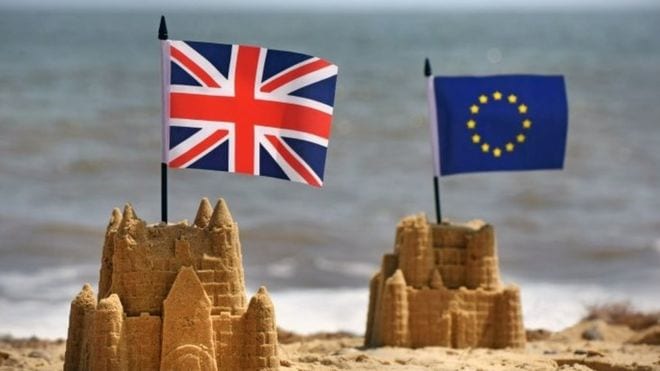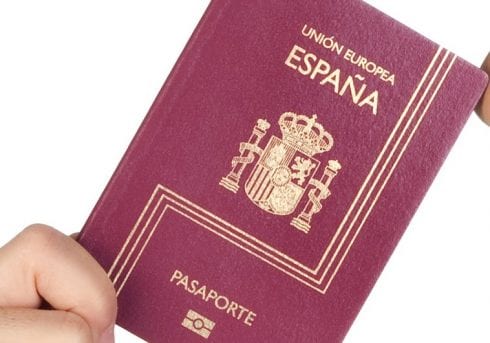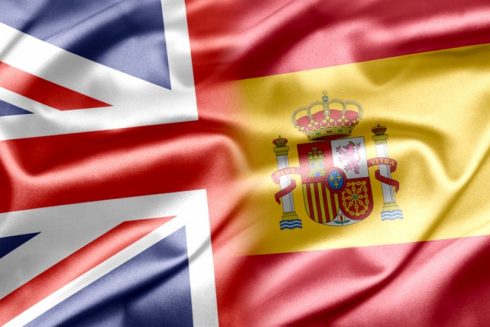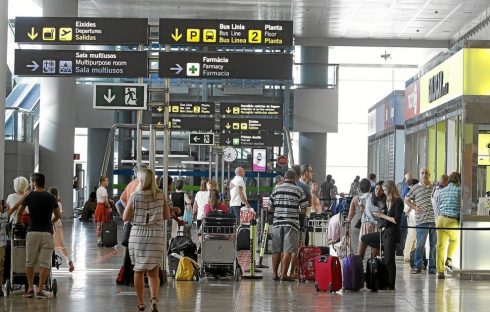
WILL I be deported? Can I still see a doctor? Do I have to fly the Spanish flag?
It’s no wonder fears are swirling among the up to one million expats who call Spain their home, as the Brexit deadline approaches like an express train.

With just over six weeks to go before the UK pulls out of Europe, it is still unclear exactly how the 300,000 registered Brits in Spain will be treated… let alone all those who come and go on a temporary basis.
In a mercy-type mission to ease these concerns, British Ambassador to Spain, Simon Manley has been undertaking a series of roadshows around the country.
At one, taking place to a packed hall of expats in Manilva last week, his message was simple: ‘Keep calm, and get registered’.
Alongside an expert panel, he carefully and clearly responded to people’s fears about their status in Spain come March 29.
Above all, he assured the 200-plus people gathered that under the draft withdrawal agreement there would be no significant changes to anyone’s rights until the end of a transition period, set to last until December 31 2020.

However, he raised a few key concerns and warned what could actually happen if the UK leaves the EU with no deal, as could still alarmingly be the case.
Here, the Olive Press breaks down the key talking points of the Brexit seminar, on everything from healthcare to pensions and the peculiar situation where Spain permits foreigners to get dual-citizenship.
See also:
- Up to 700,000 British expats could become ‘illegal aliens’ overnight after March 29
- WATCH: British expat Brexiters in Spain branded ‘stupid’ and ‘arrogant’ after admitting they would now vote Remain in Channel 4 news piece
- Spanish vineyards send as much wine as possible to UK before Brexit

Deal – ‘Your rights maintained’ but new ‘TIE’ green card needed
Expats crammed into every available space of Villa Mathilde, in San Luis de Sabinillas, in Manilva, as British Ambassador Simon Manley rose to his feet to assure anxious attendees that ‘with a deal, your rights in Spain will be guaranteed by force of international law.’
“The deal will maintain your right to residency, pensions will continue to be uprated and healthcare will continue as before,” he said.
And the diplomat calmed nerves by saying that a grace period – a paradise period for some – in which all paperwork could be sorted out, would remain until December 31, 2020.
“But that withdrawal agreement can only enter into force when it has been approved by the UK,” added Manley.
The Brexit divorce is being felt in many parts of the Union, but at this stage of negotiations it appears the source of heartache for expats on the Costa del Sol is not the English channel, nor Brussels, but the House of Commons.

If it passes before March 29, the key component of the deal for British residents in Spain will be the transition to a new form of identification.
The Ambassador announced that ‘a new card will replace the green card’ that British expats currently wield as their right to residency in Spain.
Brits will ‘at some point’ during the transition period need to submit their green registration certificates for a Foreigner’s Identity Card (TIE) – it’s the same identification that grants non-EU nationals residency in Spain – but Brits will not need to fulfil the same requirements as non-EU nationals.
Those who are NOT currently registered via the National Police will NOT however be able to acquire a TIE card..
“Please apply now,” the Ambassador urged, “there’s nothing more important you can do.”

No Deal – Assuming our rights will be maintained, but no agreement yet
In the worst-case scenario that an agreement is not reached, and the UK leaves the EU with no deal, the Ambassador warned that British expats’ rights in Spain are ‘not protected’.
He spoke passionately about meetings with Spanish Prime Minister Pedro Sanchez, who insisted he greatly valued the British presence in his country.
However, as with promises surrounding pensions, healthcare and rights to residency, the recurring word in the Ambassadors oratory was ‘assume’.
Concerning healthcare, he said: “The intentions are clear, but we have to find an agreement with Spain.”

Regarding pensions, Manley added: “We need a reciprocal agreement with Spain, because without that the default position is pensions with not be uprated – British expats in Australia do not have uprated pensions.”
A royal decree is expected this month to underline how Spain will treat British expats should Britain exit the EU without a deal.
There were sterner warnings however, from panel legal expert Myra Azzopardi, of Citizens Advice Bureau Spain.
She warned the Olive Press that up to 700,000 British people either living full time here unregistered or with interests in Spain could face immigration issues soon after March 29.
She said that under EU law, British citizens would be allowed 90 days in Spain before they would have to register themselves at the nearest national police station.
Though Spain currently has no powers to expel Brits who stay over this 90-day period, she said “after Brexit you will be expelled as an illegal alien, you could be deported.”

Number crunching
- 700,000 – the number of unregistered Brits who could be forced to leave Spain
- 26,000 – the income (in euros) you might have to prove to gain residency in the event of a no-deal Brexit
- 1,735 – the number of workers hired by the Spanish government to deal with Brexit
- 10 – years you need to live in Spain to get Spanish citizenship
- 5 – years you need to live in Spain to get permanent residency
How to get your Spanish citizenship
After living in Spain for 10 years you can apply for Spanish citizenship.
Getting this ‘golden ticket’ means you can travel, work and visit within the EU.
Spain does not permit dual citizenship however, so you would have to give up your UK passport.
But, you can also become a Spanish citizen through birth or marriage, even if your Spanish parents were born outside the country.
The other requirements include being a ‘good citizen’ and being integrated into Spanish society.
To be a good citizen you must be financially stable and without a criminal record.
Being integrated means that you must be able to speak some Spanish and ‘take part in Spanish social activities’.
If you are applying after having lived in Spain for 10 years, you must first have permanent residency.
To apply for Spanish citizenship you will need to visit your local Civil Registry office.
You will need to fill in a citizenship form and bring the following documents:

- A valid passport and copy
- For under-18s: a guardian, or both parents
- Spanish Resident Card (TIE)
- Birth certificate printed within last 90 days
- Criminal record check printed within last 90 days
- Marriage certificate if applicable
- Registration certificate printed within the last 90 days
- A CEFR certificate of at least A2 in Spanish
- A CCSE exam certificate showing the result of an exam on Spanish laws and culture
- A payment of €100
Dual citizenship exists for a chosen few
Spain does not permit dual citizenship, except for two very specific groups of people. But who are these chosen two?

1.International Brigades veterans:
This group of volunteers fought as soldiers for the Republican side in the Spanish Civil War, 1936-39.
Named after the 50 countries from which they came, the group’s largest intake was from France with 9,000 joining from the country.
The UK contributed 2,000 men to the International Brigades and 500 were killed while 1,200 were wounded.

2. Sephardi Jews who can prove a family relation to Spain:
These Jews are an ethnic group originally from Spain or Sepharad, a place of uncertain location that is mentioned once in the Bible.
The Sephardi Jews set up communities throughout Spain and Portugal, before they began to be exiled in the 15th Century.
About 16% of the global Jewish population is Sephardi and around 40,000 are thought to live in Spain.











